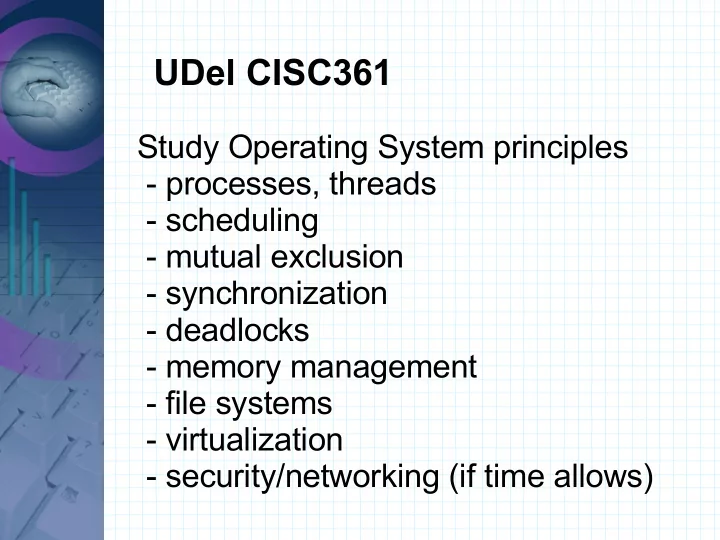

UDel CISC361 Study Operating System principles - processes, threads - scheduling - mutual exclusion - synchronization - deadlocks - memory management - file systems - virtualization - security/networking (if time allows)
Operating Systems Use of Solaris - advanced OS features - zones (virtual machines) - ZFS (advanced Filesystem) - Start up system (SMF) - Process scheduling - xVM (xen hypervisor) - etc Some mention of Linux also What is an Operating System?
What is an Operating System? Software that sits close to the hardware and acts as an intermediary between user and hardware. OK, for a desktop, but what about over the network? What about running multiple virtual systems? Also, an OS makes the hardware useful
OS Stack Applications Shell or GUI Libraries Entry points to kernel System call Interface OS kernel Device Drivers Hardware
OS Terms Kernel mode (protected from tampering) vs. User mode. Multiprogramming - allow multiple user programs to be active at the same time - can get better processor utilization - some programs may be waiting for I/O – allow others to use cpu I/O vs. compute jobs Timesharing – multiple users (jobs)
What is Unix? Developed from multics on PDP-7 by Ken Thompson at Bell Labs SYSV vs BSD Current Unix versions - Solaris, AIX, Linux, *BSD, OS X Others - HP-UX, IRIX, OSF, Tru64
SYSV vs. BSD Using Solaris as an example of each /usr/bin – contains SYSV programs /usr/ucb – contains BSD programs e.g. different options to ls and ps What about Linux? What about GNU?
Standards POSIX – Portable Operating Systems Interface for uniX. - minimal set of system calls that must be supported. - several other standards also - posix thread library (pthreads) What about GNU?
Overview of main topics Process Management Mutual Exclusion, Synchronization Deadlocks Memory Management Storage Management - file systems Virtualization Security Distributed Systems - networks
Computing Environments Stand alone PCs or Workstations Client-server Thin clients – Sun Rays, xterms Virtual systems “The Network is the Computer” Web apps platform independence
Recommend
More recommend